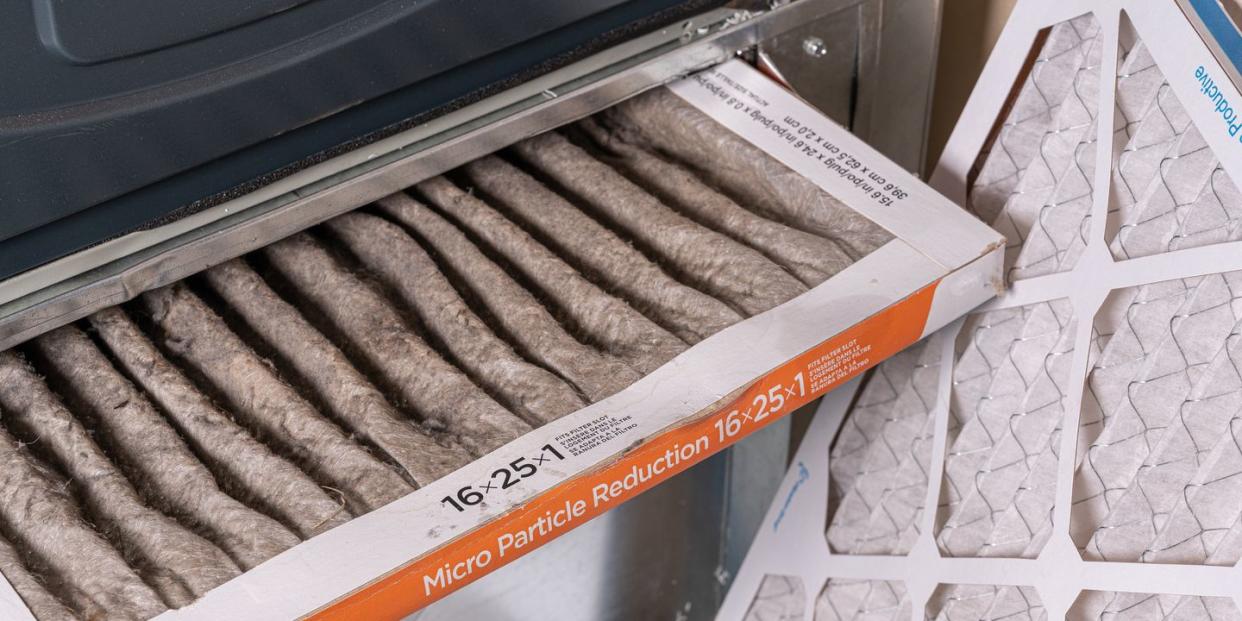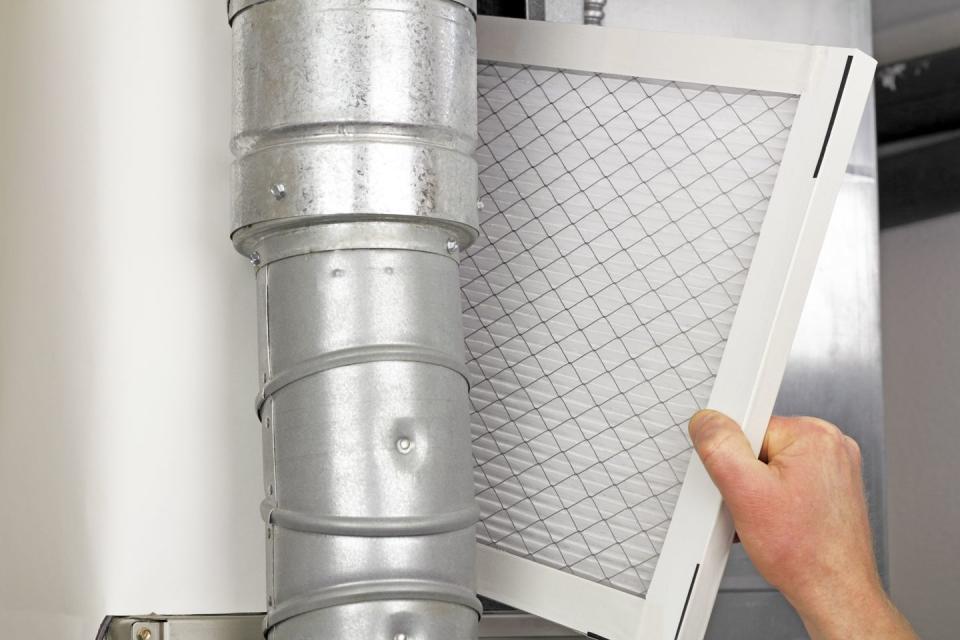You Aren't Changing Your Air Filter Enough

When was the last time you replaced your HVAC filter? Yeah, we thought so. It's one of those things you always mean to do but somehow forget. Or maybe you didn't even realize you need to change your HVAC filter periodically. No worries! This is a judgment-free zone. If you're a first-time homeowner, you have a ton to learn about maintaining your new, huge investment, so it's okay to cut yourself some slack.
However, it's crucial that you get into the habit of checking and changing your HVAC filter regularly. For starters, a dirty air filter doesn't do its job of capturing airborne particles including pollen or dust mite allergens as well, which means that more of them get recirculated for you to inhale. An old filter also makes your HVAC system work harder than it should to keep your house cool. The result? More breakdowns and repairs and higher energy bills. No one wants any of that!
The truth is this is a super-easy DIY job, and it takes only a minute to assess whether your filter needs changing. It's one of those basic routines, like cleaning your grill or winterizing your home, you should do regularly, not just every once in a while when you remember.
We reached out to Patrick Van Deventer, product manager of indoor air quality for the air-conditioning equipment manufacturer Trane Residential, to answer our biggest questions about air filters. Read on to learn more how often to change them and why.
Why Should You Change Your Air Filter?
Air filters are meant to last only a short amount of time. Not changing it can affect both your equipment and your health. "If you let it go too long, filters can load too much and collapse, and that can be really bad because you may not know it. Potentially, it could get lodged in your fan, or create a gap where air just goes around the filter and doesn't get filtered at all at that point." Here's why this matters: "If your filter isn't actually filtering, it can affect your health and cause breathing issues, especially for people who have underlying health issues such as allergies or asthma," Van Deventer says.

How Often Should You Change Your Air Filter?
Your furnace manufacturer may recommend a certain interval. When you buy a new filter, the packaging usually also will state how long it should last. But don't wait until that date to change it. Van Deventer says you should take that date as "the absolute maximum" and change your filter sooner. "The way most of those filters operate is they have a porous media that captures the particulates, and that blocks the airflow," he explains. After a while, that also starts to restrict the airflow in your system, which can make your air-conditioning unit work harder.
In general, you should look at your air filter once a month to see how dirty it is. That's truly the only way to know if your filter really needs changing. And if you or a family member has a history of allergies or asthma, plan to change your filter once a month, per the recommendation of medical associations including the American Academy of Allergy, Asthma, and Immunology.
How Do I Know If My Air Filter Needs Changed?
The environmental conditions inside and outside your house can affect your air quality and how often you need to change your air filter. "Anytime you're aware of more pollutants in the air is a good time to change your filter," Van Deventer says. That includes days when the air quality is poor due to smoke, smog, or pollen; when your pet is shedding the most (that could be year-round!); or when you're doing a home renovation project, especially if it's something that releases small particles into the air like sanding drywall.
If you need a way to remember, here's a smart tip: "Anytime you're finding yourself having to vacuum a lot more, that's a good indication that you need to check your filter more often," Van Deventer says.
You also can set a reminder on your smartphone, noting the date you changed your air filter last so that you won't forget to check ever again.
How Do You Change Your Air Filter?
You might need a ladder, but that's the most difficult part. You can change your own air filter in about three minutes. Here's how:
Turn off your air-conditioning system.
Locate your air filter. It may be where your return is (that's the vent that draws air from your home back into your heating or cooling system), either on the wall or ceiling with a grille covering it. Or it may be where your air-handling unit is, in a closet, basement, or attic.
Remove the filter. You usually don't need tools to do this. If yours has a grille, most grilles have tabs you can pull on. The filter may slide in and out of the HVAC unit itself.
Examine the filter. Most of the time, it's white when it's new. If it looks gray or you can see a thick layer of dust or pet hair on it, it definitely should be replaced. If it's unusually dirty, that's a sign you should replace it more frequently. You should also look for gaps around the edges of the filter when it's in place inside the air filter frame. If you see extra space, your filter might not be the correct size.
Find the correct replacement filter. The filter will have the size printed on it. Snap a photo so you can remember the size when you buy replacements. While you're at it, buy a few extra filters to keep on hand.
Put the new filter in and replace the grille or cover. Now you're good to go! Just note the date and set a reminder on your smartphone so you won't forget to check again on the same day next month.
What Is the Right Kind of Filter for My HVAC System?
You already know that to find the correct size filter, you look at the information printed on your current one. But if you're not sure what kind of filter to buy, Van Deventer has some tips. "I suggest to not use the cheapest option out there. Those blue or green fiber-type filters do next to nothing. I would make sure that you get a good quality pleated filter instead," he says. "Look for a pleated filter that has sturdy wire mesh to support it so it doesn't collapse."
You also want it to have a high MERV rating, Van Deventer adds. (MERV stands for "minimum efficiency reporting value.") "A good quality filter is going to be above a MERV eight or nine, meaning it's going to filter out a lot more of those smaller particles that can cause allergies and other issues," he says.
When Should You Call a Pro About Your HVAC System?
Replacing your air filter is an easy DIY job. Van Deventer says that if you're comfortable locating and changing the filter yourself, you don't need to call a professional. However, if your air filter is located in a high ceiling or near stairs, you might feel more at ease having a pro take care of it.
Regardless of whether or not you're a filter-changing pro, it's a good idea to have an HVAC contractor check on your system twice a year, once before cooling season and once at the end.
If you have any air-quality concerns, bring in a pro to discuss the issues. You might need to upgrade your system. "If you still see a lot of dust everywhere, are still dealing with difficulty breathing, or if you've got someone with asthma, you might need to upgrade your air-filtration system," he adds.
As for hiring the right pro, Van Deventer suggests looking for an HVAC contractor with good online reviews: "A reputable HVAC contractor will have a variety of solutions to offer and be able to come into your home and make an initial assessment on upgrading your system." Finally, always get at least three estimates and research your choices before committing to any repair work or new installation.
You Might Also Like

